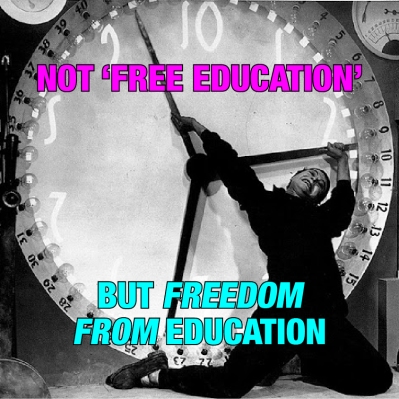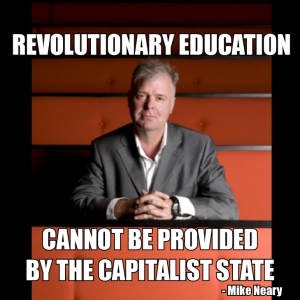Tagged: education
Freedom From Education: Decolonial Study for Abolishing the Prison-University Complex
Against the romanticizing of education, Leftists should recognize alternative regimes of study, as practiced in prison organizing and indigenous peoples’ movements, and participate with them toward dismantling the intertwined regimes of education and carcerality.
– an essay by Abraham Bolish –
Left movements in North America romanticize education in many ways. Calls to “defend public education” emanate from the most radical movements of students, like the ‘Maple Spring’ in Quebec, and teachers, like the social justice-oriented Chicago Teachers Union. In struggles against prisons, with images of the ‘school-to-prison pipeline’ and calls for ‘education not incarceration,’ we on the Left often criticize contemporary education as corrupted for disproportionately funneling poor youth of color into the penal regime. Conversely, in organizing around universities, the university has been framed as losing its educational mission and becoming like a prison, an “ivory cage,” which “incarcerates” potentially resistant young people behind walls of debt.
This fetishizing of education is a key obstacle to Left movements’ revolutionary goals. Seeing ‘revolution’ as an overturning of a dominant order, a revolutionary movement would need to radically transform all of the regimes composing that order—from the family and work to transportation and prisons. Such a movement is hindered if any one of these regimes is immunized from critique. That is precisely what has happened with the regime of education.
Occupying the City with the Social Science Centre – an Interview with Mike Neary
Summary: Professor Mike Neary speaks on the origins, purposes, and tensions of The Social Science Centre, Lincoln in the UK, an alternative form of higher education provision run as a formally constituted co-operative. The Social Science Centre sets itself against the usual colonial relations between universities and communities, seeking to occupy and re-invent the ‘idea of the university’ by producing critical, practical knowledge grounded in the real lives of its members. Neary raises questions about how such projects can create new, sustainable forms of social wealth against and beyond capitalism.
MOOCs: Education’s “The Emperor Wears No Clothes” Moment
by Abraham Bolish
The recent backlash against MOOCs has tended to romanticize an ideal of public higher education. Yet, education has always been tied up with systems of domination, and MOOCs present an opportunity to reveal the contradictions of higher education—to expose the emperor’s dirty secrets. Instead of ‘re-clothing the emperor’ with appeals to a lost ideal of public higher ed, through eight propositions I argue that we should seize the ‘MOOC moment’ as a start for breaking the capitalist, colonial chains of global higher education. Continue reading
On ‘Service Learning,’ Precarity, and Building the Urban Commons with, against, and beyond Universities
Summary:
An adjunct discusses her experiences with using ‘service learning’ in classes to engage students in militant co-research and community organizing. Such projects can build radical relationships across universities, public schools, and marginalized communities, but require a lot of work – the challenge of building ‘the urban commons.’ Such work must also grapple with the dangers of recuperation in academia. Beyond the university, she discusses her engagement with urban commons in neighborhoods, such as through co-operatives. What kind of advantages and disadvantages does the flexibility of adjunct labor offer? From the position of precarious work and life, how can we organize for mutual aid across our workplaces and communities? Continue reading




